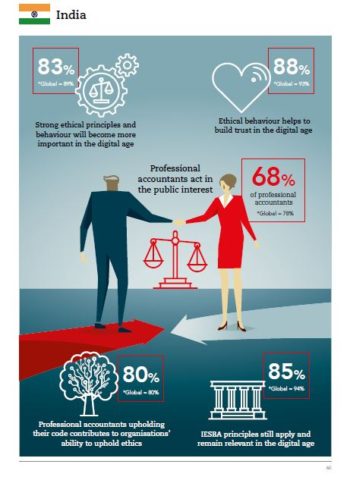Mumbai, 10 August 2017: Organisations need to put ethics at the heart of securing public trust in the digital age according to a new global study of accountants and business leaders.
Ethics and Trust in a Digital Age, a report released today by ACCA (the Association of Chartered Certified Accountants) raises questions about how prepared businesses are to face new ethical challenges such as ransomware attacks; crypto-currency transactions; intellectual property disputes and customer privacy.

Nearly two thirds of respondents called for strong ethical leadership while a majority (54%) called for guidance on a new code of ethics for the digital age. The report draws upon the views of over 10,000 professional accountants and students, including over 500 C-suite executives.
The report includes a series of short case studies exploring the ethical questions raised for accountants and auditors by digital technology. It offers guidance through assessing the scenarios alongside the five fundamental principles for professional accountants established by the International Ethics and Standards Board for Accountants (IESBA). These are: integrity, objectivity, professional competence and due care, confidentiality and professional behaviour.
Mmd Sajid Khan, Head of International Development at ACCA, says, “Professional accountants are often on the frontline of facing ethical questions in business. What is clear is that the digital age throws up new dilemmas where there are no easy answers. If you’re working in a business considering whether to start accepting bitcoin payments, or implementing cloud-based customer records, these are questions for the here and now. In the digital age there needs to be more, not less, importance placed on the ethical and professional judgement of individuals. What many are calling for is guidance and leadership on how to respond. All those involved in decision-making levels in business should be aware of how new technologies can affect their reputation and consider how to support their employees in doing the right thing.”
About the report
The survey was completed by respondents in 158 countries. Over 10,000 respondents completed the survey, roughly 40% of who were ACCA members, 55% were ACCA students and the remaining 5% were members/students of other professional accountancy bodies.
In addition, to get a view of how accountants are perceived by others, 510 C-suite respondents who interact with the accountants in their organisations were also surveyed.
The observations are informed by discussions with senior finance professionals, typically at the level of Chief Financial Officer (CFO), Partner or equivalent. These perspectives were gathered via roundtable discussions conducted in Australia, China, Kenya, Nigeria, Republic of Ireland, Russia, Singapore, UAE and the US. In addition, the perspectives are informed by the experience and expertise of ACCA’s Global Forums members.
About ACCA
ACCA (the Association of Chartered Certified Accountants) is a global body for professional accountants. It offers business-relevant, first-choice qualifications to people of application, ability and ambition around the world who seek a rewarding career in accountancy, finance and management. Founded in 1904, ACCA supports its 188,000 members and 480,000 students in 181 countries, helping them to develop successful careers in accounting and business, with the skills required by employers. ACCA works through a network of 100 offices and centres and more than 7,110 Approved Employers worldwide, who provide high standards of employee learning and development. Through its public interest remit, ACCA promotes appropriate regulation of accounting and conducts relevant research to ensure accountancy continues to grow in reputation and influence. For more information click here: www.accaglobal.com
